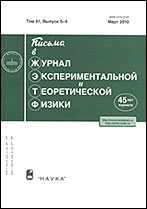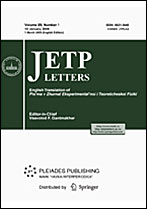|
|
Pis'ma v Zhurnal Èksperimental'noi i Teoreticheskoi Fiziki, 2003, Volume 77, Issue 7, Pages 407–411
(Mi jetpl2773)
|
 |
|
 |
This article is cited in 6 scientific papers (total in 6 papers)
Evolution of cosmological constant in effective gravity
G. E. Volovikab
a L. D. Landau Institute for Theoretical Physics, Russian Academy of Sciences
b Low Temperature Laboratory, Helsinki University of Technology
Abstract:
In contrast to the phenomenon of nullification of the cosmological constant in the equilibrium vacuum, which is the general property of any quantum vacuum, there are many options in modifying the Einstein equation to allow the cosmological constant to evolve in a non-equilibrium vacuum. An attempt is made to extend the Einstein equation in the direction suggested by the condensed-matter analogy of the quantum vacuum. Different scenarios are found depending on the behavior of and the relation between the relaxation parameters involved, some of these scenarios having been discussed in the literature. One of them reproduces the scenario in which the effective cosmological constant emerges as a constant of integration. The second one describes the situation, when after the cosmological phase transition the cosmological constant drops from zero to the negative value; this scenario describes the relaxation from this big negative value back to zero and then to a small positive value. In the third example the relaxation time is not a constant but depends on matter; this scenario demonstrates that the vacuum energy (or its fraction) can play the role of the cold dark matter.
Received: 20.02.2003
Revised: 05.03.2003
Citation:
G. E. Volovik, “Evolution of cosmological constant in effective gravity”, Pis'ma v Zh. Èksper. Teoret. Fiz., 77:7 (2003), 407–411; JETP Letters, 77:7 (2003), 339–343
Linking options:
https://www.mathnet.ru/eng/jetpl2773 https://www.mathnet.ru/eng/jetpl/v77/i7/p407
|


| Statistics & downloads: |
| Abstract page: | 158 | | Full-text PDF : | 60 | | References: | 42 |
|





 Contact us:
Contact us: Terms of Use
Terms of Use
 Registration to the website
Registration to the website Logotypes
Logotypes








 Citation in format
Citation in format 
